UNHCR and Colombia sign accord to protect land rights of displaced
UNHCR and Colombia sign accord to protect land rights of displaced

BOGOTA, Colombia, April 9 (UNHCR) - The UN refugee agency and the Colombian government have signed an agreement that could protect or restore the land rights of hundreds of thousands of displaced people.
The accord was signed Tuesday in Bogota by UNHCR Representative in Colombia Jean-Noël Wetterwald and Colombia's Agriculture Minister Andres Felipe Arias. The pact was given further weight by the attendance of Colombian President Álvaro Uribe at the signing ceremony.
"The agreement provides a framework for the coordination of various projects already in place for the legal protection of abandoned lands and also plans for new initiatives to restore displaced people's property rights," explained Jean-Noël Wetterwald, UNHCR's representative in Colombia.
He welcomed the accord, which addresses one of the core issues of concern to the 2.4 million Colombians on the national registry for internally displaced people (IDPs). They have lost an estimated 6 million hectares of land - equivalent to 6 percent of Colombian territory - in their flight from armed conflict and violence.
But very few have received compensation for their loss. Some 78 percent of these 2.4 million registered IDPs come from rural areas, where most worked the land. Loss of their fields has meant loss of their livelihood.
The majority now live in urban areas, often in very deprived neighbourhoods, and experience great difficulties finding employment. According to a recent United Nations study, around three-quarters of IDPs in Colombia live below the poverty line.
"All my life I worked on the farm and was able to feed my five children," said Marco, who fled his rural smallholding last December and escaped to the town of San José de Guaviare in south-east Colombia. "Here I feel useless, everything we eat we have to pay for and I can only find a day's work now and then."
Marco and his family live under plastic sheeting and a zinc roof in a rundown neighbourhood of the riverside town. There are no sanitation facilities and no running water. Losing his land and not knowing what has happened to his farm and livestock is the worst thing that ever befell Marco. He would like to go back but his wife is scared and won't let him.
Marco's only consolation is that when he fled his farm he also took a copy of his land titles, which he now hopes to register through the Tierras Project. In the past four years, this UNHCR-backed programme has registered more than 2 million hectares of land belonging to displaced people or to communities identified as being at high risk of forced displacement.
Once registered, the land is frozen, meaning that it cannot be sold without the approval of its rightful owner. Local authorities can also freeze land in an entire village if they believe that an escalation in fighting puts its population under imminent threat of displacement.
The new agreement seeks to bolster and coordinate such initiatives for the legal protection of IDP property rights. Other projects will focus on restoring productive lands to displaced people who lost properties during their flight. Tuesday's accord provides hope for greater social economic stability, as well as restoration of violated rights to displaced families in Colombia.
Wetterwald said UNHCR would fully cooperate with the government, civil society and the displaced population to identify the best possible ways to ensure restitution of lands and property to IDPs.
By Marie-Hélène Verney in Bogota, Colombia








